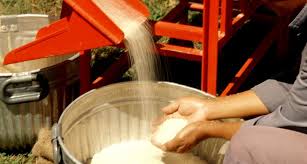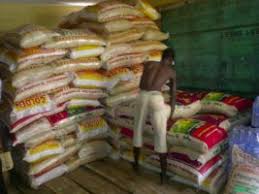Food
-
2.6 million Kenyans face starvation-Govt.
- By solomon2day
- On 21/09/2019
- In News
The Kenyan government has disclosed that about 2.6 millon citizens face starvation in 23 arid and semi-arid locations in the country.
The government made this disclosure through it spokesperson,Mr. Cyrus Oguna.
The government said that of the number 623,000 were children while 69,000 were pregnant and lactating mothers, who were at risk of malnutrition as drought ravages the regions.
It noted that Turkana was the worst affected, with 250,000 children aged under five in Turkana North, Turkana South and Laisamis sub-counties experiencing acute malnutrition,while Another 200,000 in Turkana West and Turkana Central, Baringo, Tana River, Samburu and Moyale were faced critical malnutrition.
“Eight out of the 23 counties are severely affected by drought and require urgent enhanced relief food assistance. They include Garissa, Mandera, Wajir, Marsabit, Tharaka-Nithi, Isiolo, Embu and Kitui,” the government spokes person stated.
-
Nigerians Score President Buhari Low over soaring Prices of Food Items
- By solomon2day
- On 16/09/2019
- In News
Nigerians have expressed disappointment over the failure of the Federal Government to check the soaring prices of food stuff in markets across the country.
They lament that the high cost of the food items such as rice, tomatoes, pasta among others have made most citizens to opt for items like ‘’garri’’ in particular, coco yam and maize among others.
Millions of Nigerians are now of the belief that the President Muhammadu Buhari led administration in the country is nonchalant and insensitive to the hunger and poverty situation in millions of homes in Nigeria, even though most political office holders and government officials are currently benefiting from the closure of the country’s borders in a sizable number of states.
They passionately appeal to the powers that be to reverse the present order of things in the markets, as a step towards rescuing millions of Nigerians living in hunger and poverty.
-
Food Sufficiency : Govt. Ought to stop Importation when Edibles are in Abundance and Affordable-Prof. Olagoke
- By solomon2day
- On 15/08/2019
- In Special Report
 The debate among Nigerians in the present time is on the promise made by President Muhammadu Buhari to cater for the poor and downtrodden in the country, as he positions to make a difference in his second term.
The debate among Nigerians in the present time is on the promise made by President Muhammadu Buhari to cater for the poor and downtrodden in the country, as he positions to make a difference in his second term.The President’s promise is coming on the heels of his directive to the Central Bank of Nigeria(CBN) to stop the issuance of foreign exchange to those who import foodstuff.
Nigerians, however, insist that since the country is yet to attain food sufficiency, while hunger and poverty still remain in millions of homes, the President’s directive is an indication that the present administration does not have workable plans to rescue majority of Nigerians from the vicious cycle of poverty.
In this interview, the Founder, Spiritual Head and Grand Imam of Shafaudeen-in-Islam worldwide, Prof. Sabitu Olagoke asserts that the importation of edibles and related products can only be regulated and controlled when when there is food sufficiency in the land. Excerpts :
What do you think is the best way to ensure food sufficiency in Nigeria ?
In the areas of the fundamental needs of man, that is food, shelter and clothing, Science and Technology have offered a great mass of opportunity for mass production of the raw materials, in terms of mechanized farming and processing units for varieties of products to cater for Nigeria’s food sufficiency.
Unfortunately for Nigeria, the endemic culture of corruption will fail again to succeed, with particular reference to the agro-allied and textile industries. This is why Nigeria depends solely on the importation of some raw materials as well as most finished products.
Nigerians are put in the dark by successive governments till date, on the purpose for the establishment of universities of agriculture, research institutes, Polytechnics as well as universities of Science and Technology.
The general complaint, is majorly under funding by government coupled with several cases of corruption, that belittles the establishment of SERVICOM( Service Compact (Agreement) between the Federal Government including all its organs and the Nigerian people) and The Anti- Corruption and Transparency Unit (ACTU), in various Ministries, Departments and Agencies and the overwhelming corruption and institutional indiscipline that rubbish all efforts of the Economic and Financial Crimes Commission(EFCC) and the Independent Corrupt Practices Commission (ICPC) under successive governments till date.
 This kind of cloudy scene neither favors good governance for productive resources nor Nigeria for the expected development, where Democracy is expected to bring forth prosperity and general welfare of the people.
This kind of cloudy scene neither favors good governance for productive resources nor Nigeria for the expected development, where Democracy is expected to bring forth prosperity and general welfare of the people.It is pertinent therefore, for government to publish state by state statistics of the yield of their adventures in agriculture, for Nigerians to be sure that their claim is not far from the truth. This is because the prices of commodities have not gone down and most of the food and related items in the markets are imported.
 When Queen Elizabeth II, visited Nigeria during the tenure of former President, Chief Olusegun Obasanjo, she requested the President to take her to some markets in Abuja.
When Queen Elizabeth II, visited Nigeria during the tenure of former President, Chief Olusegun Obasanjo, she requested the President to take her to some markets in Abuja.While at the markets, the Queen took note of the the facial expression of the traders and buyers alike, to conclude that there was poverty in the land.
After, the visit to the markets, the Queen advised the President to address the issue of poverty in Nigeria.
It is equally unfortunate that Nigerians continue to complain about the quality of most of the home made goods and agricultural produce, despite the fact the we have research institutes that should continually sensitize the public and train the farmers on modern planting techniques.
The treating of foodstuff with poisonous chemicals, features daily in news reports, as Nigerians wonder how this came about, even with the National Agency for Food and Drug Administration and Control (NAFDAC), National Drug Law Enforcement Agency (NDLEA) and Standards Organisation of Nigeria, in place for quality assurance and standardization gauge to ensure people’s safety and security.
To ensure food sufficiency, government needs to address the issue of middle men and other agents, whose sole objective is profit making at the expense of the people.
 Transparency and accountability is the Governance Perception Index essence on all institutions that that have direct or indirect links in terms of reaching the people with any product for purchase or production.
Transparency and accountability is the Governance Perception Index essence on all institutions that that have direct or indirect links in terms of reaching the people with any product for purchase or production.Besides food sufficiency, the poverty in the land is equally creating problems for millions of Nigerians, in the face of the high cost of commodities that the government claimed to be in abundance.
Importation of food stuff ought to be regulated and controlled, only when, government is certain of the abundance of raw materials and finished products for the consumption of Nigerians.
The pulse of the nation is more sensitive, precise and reliable as a measure of government’s performance, when governments officials roam the streets of Nigerian and our local markets, to listen to the people’s views, for the Presidency to know the truth, so as to be able to make necessary amends and curb the wastage. This wastage is brought about by those unpatriotic Nigerians who siphon the nation’s wealth, by virtue of their positions in government.
Governance by fact finding with the aid of Science and Technology, is more effective and better than consultation of the oracles, which is abstract` and could mislead a focused government.
President Buhari should beware of the sycophants and take the needed action to justify his good intentions.
-
Foundation Feeds Families in Seychelles
- By solomon2day
- On 16/05/2019
- In News
 Seychelles Sustainable Tourism Foundation(SSTF) in continuation of its "Don't Waste, Eat!" food waste reduction programme' has distributed over 200 kilogrammes of food to over 35 families.
Seychelles Sustainable Tourism Foundation(SSTF) in continuation of its "Don't Waste, Eat!" food waste reduction programme' has distributed over 200 kilogrammes of food to over 35 families.The "Don't Waste Eat!" food waste reduction programme kicked off in July 2018 and is facilitated by the Seychelles Sustainable Tourism Foundation, (SSTF) in collboration with Betterfly Tourism --a software publisher for tourism profession.
The programme serves to equip staff with necessary skills to measure and monitor food waste, provide hotels with a platform that facilitates monitoring of cost savings and food waste reduction.
According to the SSTF Project Officer, Rosetta Alcindor. the Foundation is committeed to putting smiles on the faces of families.
"There is more to a food donation than what we usually think. We are not only providing food for the community and diverting good food from the landfill, but we are also putting smiles on families' faces.''
"Though a lot of the products are buffet leftovers or had reached their best before date, they are still good for consumption.''
"As the food is donated, it reduces the demand for importation of food products on the market as families now consume what they were donated, hence avoiding CO2 emissions along the supply chain," Alcindor stated.
Families received vegetables, fruits and other food products which included pastries, cakes and bread. The donations were made by SPAR supermarket and a number of hotels which are members of the Seychelles Hospitality and Tourism Association such as Alphonse Island Lodge, Constance Ephelia, Bravo Restaurant, H Resort and Kempinski Seychelles Resort.
